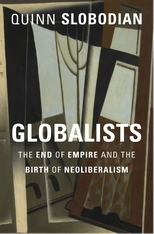

Some friends on Facebook and elsewhere have recently been discussing historian Quinn Slobodan’s Globalists: The End of Empire and the Birth of Neoliberalism. Many of them have found fault with it. San Jose State University economics professor Jeff Hummel, who is not on Facebook, has listened to the whole book and sent me his reactions. I found them interesting because they are a critical review: critical, not just in the sense that Jeff criticizes, but also in the more general sense: Jeff also finds virtues in the book.
I confess that I have not read the book yet. But when I’ve read books that Jeff has sent me reviews of, I have generally found myself in 90+ percent agreement with his evaluations. Jeff has given me permission to post an edited version of his thoughts.
Before getting to them, though, I’ll give the thumbnail summary on the book, the first paragraph of the publisher’s (Harvard University Press) three-paragraph summary:
Neoliberals hate the state. Or do they? In the first intellectual history of neoliberal globalism, Quinn Slobodian follows a group of thinkers from the ashes of the Habsburg Empire to the creation of the World Trade Organization to show that neoliberalism emerged less to shrink government and abolish regulations than to redeploy them at a global level. [bold in original.]
Here’s Jeff.
I’ve now finished listening to Quinn Slobodian. I found it fascinating. I then re-read the draft of Phil Magness’s review and was again impressed. [DRH note: Phil’s review, which Jeff and I gave him comments on, will be published in a forthcoming issue of Reason.] Phil uncovered flaws and weaknesses in the book that I would have otherwise totally missed. Without taking anything away from Phil’s review, here is my perspective on certain questions.
- Slobodian uncovers a lot of interesting historical details. One is that the Austrians early emphasized economic statistics before rejecting them. Despite the fact that Slobodian is not economically literate, the only strikingly offensive chapter is the conclusion.
- As an example of Slobodian’s economic ignorance, the most important weakness in the book is that he treats free trade as if it was being promoted exclusively by what he terms the “Geneva School.” In fact, as you well know, the desirability of free trade is one of the issues on which there is almost universal consensus among economists. [DRH note: See the article “Free Trade” in The Concise Encyclopedia of Economics and see my reference to this consensus in my Preface to the Encyclopedia. Note: with the redesign of the page, I can’t find the Preface.] This blindness distorts the book’s entire narrative.
- Like Nancy MacLean in Democracy in Chains, Slobodian tries to paint the economists he is discussing as anti-democratic, although he does this much more subtly and honestly than she. But that still leaves him caught in the same vagueness and inconsistency about what the term “democracy” actually means. He repeatedly treats democracy and the rule of law as if they were totally contradictory concepts. (He is also quite confused about the concept of “rights.”)
- On the split between Friedrich Hayek and Wilhelm Ropke, Slobodian says a lot about the split from the perspective of Ropke. This split foreshadowed and paralleled the later libertarian-conservative split.
- Slobodian occasionally cites predictions made by such free-market economists as P.T. Bauer about the consequences of certain policies. But his tone suggests that he sees these predictions as mere polemical flourishes to promote an agenda. What is interesting, and bizarre, is how oblivious Slobodian is to the obvious fact that subsequent events fully validated many of the predictions.
- One thing Slobodian does bring out clearly is the inconsistency of developed countries, especially the United States, when pushing free trade on less developed countries through the GATT and the WTO. They repeatedly made exceptions for their own policies that violate the principle, especially with respect to agricultural subsidies.
- As far as I can tell, Slobodian covers Hayek’s writings on constitutionalism and the rule of law well and fairly. In fact, for an unbiased reader, he may even make Hayek’s views attractive. I admit I could be mistaken, since I’ve never read much of Hayek’s writings on these subjects. It is a theme of his later thought that I never found interesting or valuable. And Slobodian’s discussion actually reinforces my assessment.

READER COMMENTS
Dainel Kuehn
Nov 30 2018 at 1:56pm
I didn’t get the sense at all that he was saying only the Geneva School supports free trade. Perhaps there’s a specific line Jeff interpreted that way that’s bothering him that I’m not recalling but that’s not the impression I get of the book at all.
These accusations of being “economically illiterate” are tiresome and obnoxious. The book is very obviously written by a historian and not an economist, but I wouldn’t call it economically illiterate (unless all that’s supposed to mean is “not an economist”).
Mark Z
Dec 4 2018 at 12:57am
Being an historian doesn’t, IMO, get a pass for making claims on economic questions. Once you enter a different domain, “but I’m still wearing my historian hat” is no longer an acceptable excuse. And claims of economic illiteracy may be tiresome, but not as tiresome, IMO, as the economic illiteracy itself that persists among so many historians. I was a history major in college, I’m all too aware of how pervasive it is.
Mark Z
Dec 4 2018 at 1:07am
On number 6, a salient feature of this hypocrisy is that it actually contradicts protectionist theory. Most protectionist economists (I’m thinking Dani Rodrik and Ha-Soon Chang) argue that protectionism helps foster ‘infant industries.’ However, since the 19th century, western countries have been protecting their waning agricultural sectors usually to the chagrin (and at the expense) of their successful industries. British industrialists arguing for free trade against the Corn Laws comes to mind.
Even today, the tariffs we’re seeing in the US are being deployed to help declining industries like steel and coal, not potentially productive upstarts. Western protectionism is sometimes suggested to prove that western nations don’t really believe free trade is the best economic policy. In fact, I think most western protectionism barely even purports to be good economic policy. To me, it’s clearly just welfare (but supposedly with more dignity) for declining industries.
David Henderson
Dec 4 2018 at 9:14am
Good point, Mark Z. And particularly inefficient welfare.
Comments are closed.